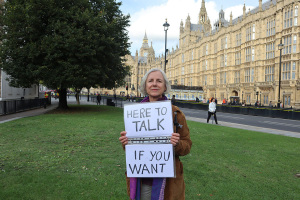Voting Rights and Ex-Prisoners
Long after they are released from prison, long after they have "paid their debt to society," ex-prisoners continue to pay the price for their crimes. As highlighted recently in an excellent article in the New York Times by Alfred Blumstein and Kiminori Nakamura, ex-offenders struggle to find employment, can be barred from public housing, and even be denied grants for tuition.
And many are denied the right to vote, sometimes for life. That topic was pulled into the national spotlight last week during the heat of the presidential campaign.
A Political Action Committee supporting Mitt Romney blasted Rick Santorum because Santorum voted in the senate to restore the voting rights of ex-prisoners. The issue resurfaced in the South Carolina debate, with a heated exchange between the candidates.
Trying to prove who's tough on crime and who's not has long been a part of political campaigns. Who can forget the infamous Willie Horton case back in 1988? But as I wrote in the Washignton Post today, I thought we'd outgrown playing political football with people's lives! Well, sadly I was wrong.
Since my White House days I have never publicly endorsed or opposed a political candidate, and I will not now. But I must speak out because it is appalling when candidates try to demonize an entire class of people - in this case ex-prisoners - to score political points.
Now, voting doesn't pose a threat to public safety. Sound criminal justice policy has always held that the goal of punishment and rehabilitation is to turn ex-offenders into responsible citizens. And once they show that they can be responsible, there can be no justification - besides scoring political points - for refusing to restore their civil rights.
Restoring voting rights is an important way society can signal ex-prisoners that they have repaid their debt to society and may now participate as equal citizens. Allowing ex-prisoners to vote costs the taxpayer nothing. But being able to walk into a voting booth, and to re-join the body politic, means a lot to ex-prisoners.
I know. I went to federal prison for my role in Watergate. I served less than a year. But it took 30 years to get my voting rights restored. But forget about me, what about a young man convicted of a few minor drug offenses. Once he grown up and proven himself a productive citizen, should he be punished for life because of youthful indiscretions?
Folks, it's not just voting rights. Look at the political flap in Mississippi over Governor Haley Barbour's recent pardons. Yes, I understand that granting pardons can cause pain for victims and their families. But historically, the power of pardon has been used by the executive to correct the mistakes of an imperfect justice system or to extend forgiveness to those who have been rehabilitated. Sadly, it's also an easy target for political demagoguery.
As I wrote in the Post, I know politics is bare-knuckled game, but demonizing an entire class of Americans for electoral gain is wrong. And if we want these ex-offenders to become contributing members of the community, we should not kick the bottom rungs off the difficult ladder they have to climb.





























